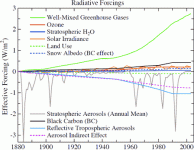Lack of sediment formation is having major impacts in Chinese river deltas too.
Some of the stuff in this article makes me chuckle. The references to people being relocated from the Lockyer Valley, Queensland is one such instance. After the flash floods of 2011 killed dozens of people, and caused billions of dollars worth of damage, serious and concerted efforts were made to relocate the residents of Grantham (elevation ~100m+ above sea level, and located over 100km from the coast!) off the inland creek and river floodplains up onto nearby higher hilltop ground. Locker Valley Mayor Steve Jones said of the old town's location and the disaster,
"We're stupid bastards, we just keep building in the swamp".
Nothing at all to do with climate change (whatever it's cause), and everything to do with human folly.
This to me represents the biggest threat, concreting over riparian areas and destroying their functioning (air conditioning, water flow regulation, and soil formation - that's carbon sequestration).
https://eos.org/opinions/global-sig...s&utm_medium=email&utm_campaign=EosBuzz032417
Way too many known, and unknown unknowns in the whole Carbon-CO2 system for humans to be mucking about in it in any way at all in my view, and this includes CO2 emission reductions .... (pollution reduction I'm all for - air quality and water quality - way too much plastic in the oceans).
By all means keep heading toward the solar powered future, and researching the whole system (I'm getting mighty hungry waiting for that pie), but don't pretend we're smart enough to be mucking around with fertilized ocean solutions etc.
Why is it that no-one ever mentions that water vapour (an emission from hydrogen powered engines) is a greenhouse gas thus rendering that solution nonsensical?
http://www.roperld.com/science/fuelcellspollution.htm
Chosun :gh:






